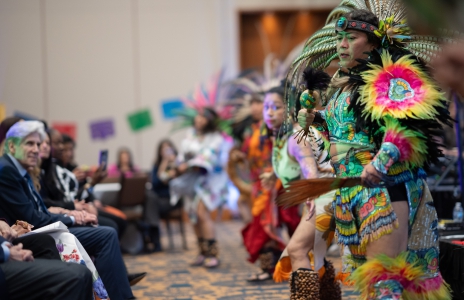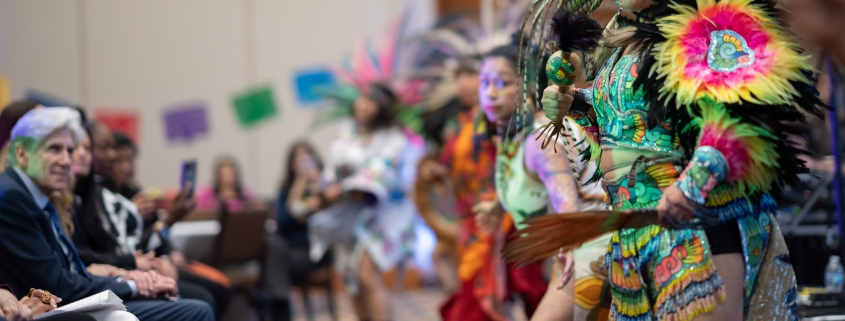Ceremony, connectiveness mark the start of ‘a different kind of UCLA’ for Latino Bruins
By Madeline Adamo | April 3, 2025

David Esquivel/UCLA
Members of Danza Azteca Tonatiuh de la Puente were among several cultural groups helping to memorialize the opening of UCLA’s Latinx Success Center which took place March 31.
The joyous, standing-room-only crowd that showed up to celebrate the opening of UCLA’s Latinx Success Center on Monday at the Carnesale Commons ballroom made one thing clear: For students, those who support them and those upholding inclusive excellence on campus and in the community, this moment felt personal.
The event, billed as “Floreciendo en Comunidad,” or flourishing in the community, brought out hundreds of students, staff, faculty and alumni — many of whom played a role in making the center a reality — for an afternoon of cultural performances, food, art, speeches, media interviews and remarks from Julio Frenk, UCLA’s first Latino chancellor.
“In this new home, students will form lasting friendships, build connections and tap into programs and services that help them flourish at UCLA and beyond,” said Frenk, who was joined by his partner and UCLA’s associate of the chancellor, Felicia Marie Knaul, as well as former Chancellor Gene Block, Carol Block and other campus leaders.
That commitment to helping students flourish by improving their experiences and academic outcomes through culturally responsive services resonated with Arelys Placido, a third-year student and undergraduate representative for the Latinx Success Center, which was conceived and launched largely by students.
“It’s really nice visually seeing the amount of people who played a role,” she said. “The consideration of student voices from the start of this effort is a great indicator that this center will be for students.”
What is the Latinx Success Center?
The new center, located on the Hill at De Neve Birch, is open to all undergraduates, 24.2% of whom identify as Latino. Students will have access to advising and academic services, as well as leadership and mentorship programs to prepare them for careers and life outside the university. The goal is to advance academic achievement, increase student retention and improve graduation rates — and, importantly, enhance students’ sense of community and belonging.
The space itself, which is informed by other models, like UCLA’s Black Bruin Resource Center, will include areas for studying and scholarly presentations and a pantry stocked with foods familiar to Latino students.
Why it’s important
Frenk emphasized at the event that the center’s opening comes at a critical moment for higher education and the nation, as programs and initiatives that strive to foster the “highest levels of excellence by promoting inclusion and diversity” come under increasing fire. The chancellor stressed the importance of “offering a fair chance in life to everyone” and pointed to UCLA’s values as means of fostering inclusive excellence.
He also spoke about UCLA’s progress toward becoming a federally recognized Hispanic-Serving Institution. “Greater representation of Latinx students at UCLA is a key part of that designation,” he said, “but representation can only be sustained if our campus is a place of real belonging.”
A feeling of belonging
When Frenk provided a public address to Univision News in Spanish, one of numerous media outlets present, and pronounced “UCLA” as “oo-klah,” the room erupted in applause. That’s how the university is affectionately known in many Spanish-speaking homes, said Álvaro Castillo, a UCLA College communications and operations coordinator. The moment held significance for Castillo, who says he feels proud to see UCLA’s seventh chancellor represent Latinos.
Alicia Miñana de Lovelace, a UCLA Law alumna, former board chair of The UCLA Foundation and a champion of the center, also spoke about the importance of feeling connected.
“Look for affinities, because they will support you and they will propel you forward,” she said. “There is strength in affinity. Gain confidence, trust yourselves and trust each other.”
For students, by students
The center is, in many ways, the product of UCLA students’ vision and work, and current undergraduate Daniela Cortez Bravo spoke on behalf of the students whose dedication helped bring the project to fruition — many of whom sported colorful boutonnieres. Adriana Galván, dean and vice provost of undergraduate education, whose office will oversee the center in collaboration with UCLA Student Affairs, also offered praise.
“This started as a grassroots effort of students. Students told us that they needed this space, and we listened. All of you listened. We want to honor that,” Galván said. “It’s critical that such an entity exists with a physical home — a gathering place [where] all Bruins, including Latinx, first-generation and low-income students, can thrive and reach their highest potential.”
Elizabeth Gonzalez, the inaugural director of UCLA’s Hispanic-Serving Institution initiative, gave remarks and a heartfelt recognition to Julie Sina, UCLA’s associate vice chancellor for Alumni Affairs, who worked closely with the UCLA Latino Alumni Association and other former students to answer the call of current students in need of a center.
“It fills me with joy to see so many of you here, because that really is what it’s taken for us to create this moment, is all of us together,” Gonzalez said.
Honoring the Latino community
March 31, the federal holiday honoring late labor leader and civil rights activist Cesar Chavez, was deliberately chosen to mark the center’s opening, said Claudia Salcedo, assistant vice provost for academic partnerships and director of UCLA’s Center for Community College Partnerships.
“It was intentional that we’re here celebrating [Chavez’s] birthday today — a product of decades of advocacy,” said Salcedo, who helped lead efforts to launch the center and has spent 25 years advancing UCLA’s commitment to Latino students. She emphasized that the new center, as a continuation of Chavez’s legacy, reflected a “genuine commitment to justice and liberation.”
“This achievement belongs to all of you,” she told the crowd.
A feast of culture, food and community
Throughout the afternoon, which also featured a symbolic ribbon cutting and the presentation of a congratulatory certificate from the office of Los Angeles County Supervisor Lindsey Horvath, artists and performers entertained the crowd.
Alumnus Alejandro Xipecoatl Juarez-Ugalde and his ensemble Danza Azteca Tonatiuh de la Puente performed folk music and dance in traditional costumes, UCLA’s Mariachi de Uclatlán played ballads, and Los Angeles–based Chicano band Las Cafeteras got the crowd up and dancing in the ballroom.
During the event’s reception, attendees socialized and sampled fare that included assorted empanadas and aguas frescas, conchas and café de olla, and candy like Pulparindo fruit rolls and De la Rosa Mazapán rounds.
Jaden Oquendo, a fourth-year student, posed for photos with friends from the UCLA Community Programs Office in front of a banner decorated with intricate paper-cut garlands.
“We just wanted to show our support,” he said. “For us, coming from the background of being able to support students, we’re eager to further expand that support through the center.”
Liliana Gaytan, a fourth-year student who transferred from East Los Angeles College, said she thinks the center will help nontraditional students like herself build strong community.
“We have now achieved a space for us to grow and experience a different UCLA than we’ve seen in the past,” she said. “It will be a really nice experience to see what it becomes. I think it’s going to provide a unique space for us that will just be great.”
This article originally appeared in the UCLA Newsroom.


 David Esquivel/UCLA
David Esquivel/UCLA PUMA
PUMA Inter-American Institute for Cooperation on Agriculture
Inter-American Institute for Cooperation on Agriculture